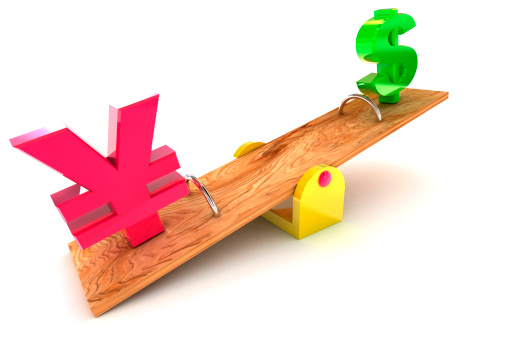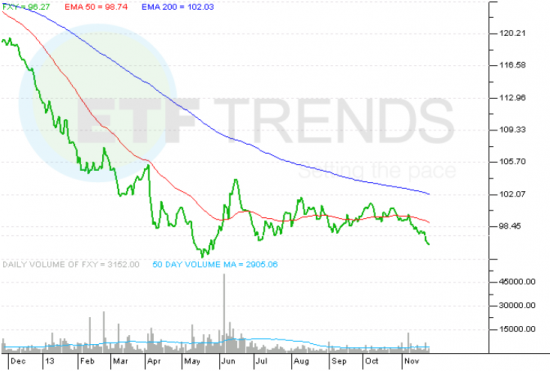Hedge Fund Action Points to Further Pain for Yen ETF
November 26th 2013 at 2:30pm by Tom Lydon

Futures traders pushed net shorts – bets that the yen will fall against the U.S. dollar – to the highest since July 2007, reports John Detrixhe for Bloomberg.
“Everybody likes dollar-yen higher,” Brad Bechtel, the managing director at Faros Trading LLC, said in the article. “And everyone has it on.”
George Soros reportedly made $1 billion between November 2012 to February 2013 on bets against the yen. Soros’ former chief strategist, Stan Druckenmiller, the founder of Duquesne Capital Management LLC, is “short some yen,” while being “long some Japanese” stocks.
The Bank of Japan has enacted an aggressive $70 billion monthly bond purchasing program since April to depreciate the strong yen currency, stimulate economic growth and reverse deflationary pressures. Consequently, the yen has declined 15% this year, the fastest drop since 1979.
The Bank of Japan has set an inflation target of 2% in two years. Governor Haruhiko Kuroda expects the target will be achieved sometime late in 2014 or early 2015. To put this in perspective, consumer prices have been declining 0.1% per year over the past 15 years. [Next Year Could be a 2013 Sequel for Japan ETFs]
Speculation that the Fed could taper its $85 billion a month bond purchasing program has also weighed on the yen against the U.S. dollar – tapering would reduce the supply of U.S. dollars in the economy and strengthen the U.S. dollar against foreign currencies. Fed minutes indicate they could reduce stimulus “in coming months” as the economy improves. [Yen ETF Investors Say ‘Sayonara’ in Risk-On Environment]
The yen traded as low as 101.92 per U.S. dollar Monday, the lowest since May. The Japanese currency sits around 101.32 per USD Tuesday.
The CurrencyShares Japanese Yen Trust (NYSEArca: FXY), which follows the price movement of the Japanese yen against the U.S. dollar, has declined 14.8% year-to-date.
As the yen continues to weaken and the Japanese economy expands, investors can take a look at yen currency-hedged Japan equity ETFs, like the WisdomTree Japan Hedged Equity Fund (NYSEArca: DXJ) and db X-trackers MSCI Japan Hedged Equity Fund (NYSEArca: DBJP), which have gained 35.6% year-to-date and 42.9% year-to-date, respectively. In comparison, the iShares MSCI Japan ETF (NYSEArca: EWJ), a non-currency hedged ETF, rose 24.3% year-to-date. [Good News for Japan ETFs: Goldman’s Still Bullish]
CurrencyShares Japanese Yen Trust

For more information on the yen currency, visit our Japanese yen category.
Max Chen contributed to this article. Tom Lydon’s clients own shares of DXJ.
The opinions and forecasts expressed
herein are solely those of Tom Lydon, and may not actually come to pass.
Mr. Lydon serves as an independent trustee of certain mutual funds and
ETFs that are managed by Guggenheim Investments; however, any opinions
or forecasts expressed herein are solely those of Mr. Lydon and not
those of Guggenheim Funds, Guggenheim Investments, Guggenheim
Specialized Products, LLC or any of their affiliates. Information on
this site should not be used or construed as an offer to sell, a
solicitation of an offer to buy, or a recommendation for any product.
1 comment:
Sports betting system generates +$3,624 profit last week!
Z-Code System winning picks and forecasts for MLB, NHL, NBA & NFL...
Post a Comment